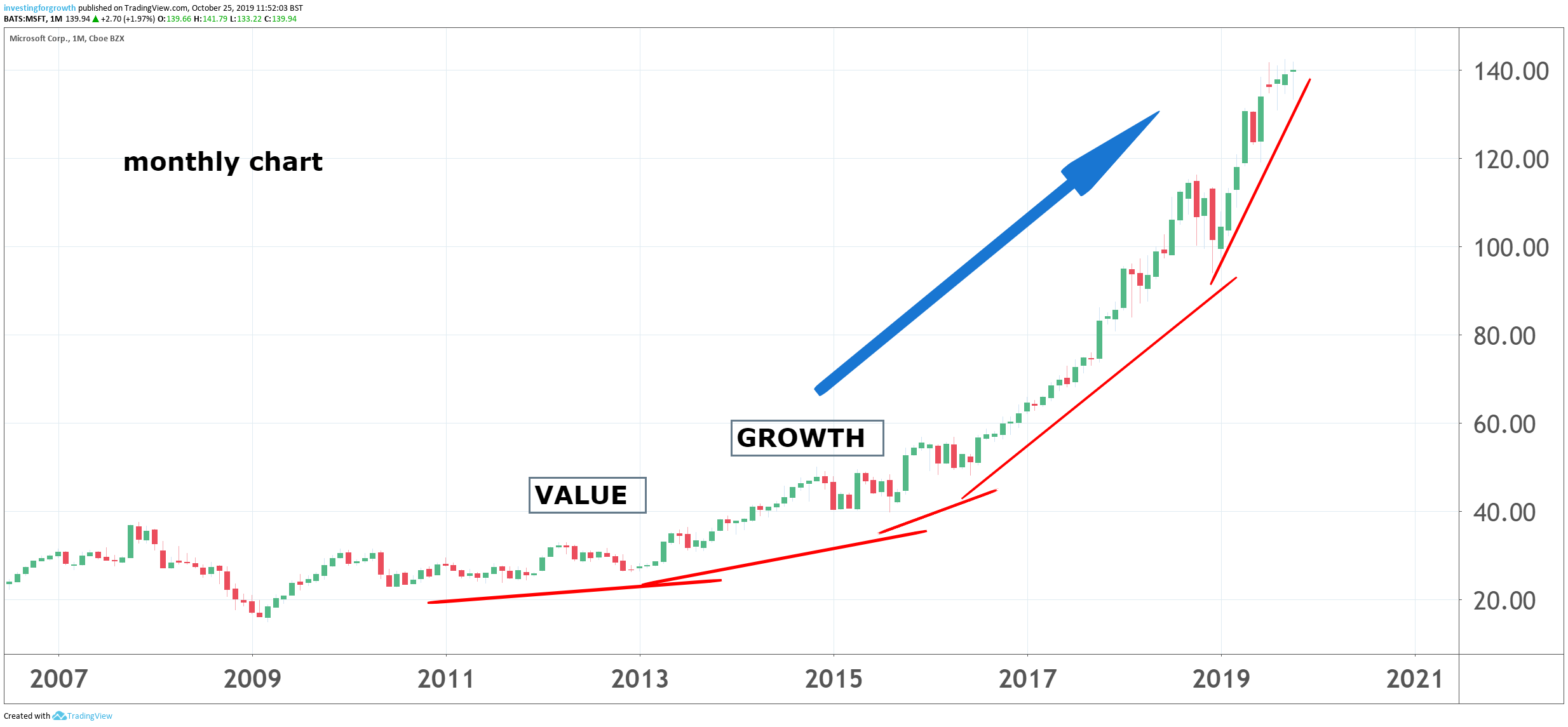Stockwatch: A trillion-dollar company worth holding on to
This behemoth still offers a better risk/reward profile versus Amazon, argues our companies analyst.
25th October 2019 11:32
by Edmond Jackson from interactive investor
This behemoth still offers a better risk/reward profile versus Amazon, argues our companies analyst.

Microsoft Corp (NASDAQ:MSFT) has delivered another set of expectations-beating results, while its chief rival in the cloud computing space – Amazon.com (NASDAQ:AMZN) – has missed consensus for third-quarter 2019 profit.
Amazon's profit is down 26% like-for-like and its stock fell 7% in reaction; yet Microsoft was initially flat at around $137 in response to its results before creeping up to $140, pretty much where it has traded in recent months.
Possibly this reflects weariness in both the business cycle and US stock market, meaning extra care is needed.

Source: TradingView Past performance is not a guide to future performance
Mixed updates so far from third quarter 2019
Mind how latest updates appear to be prompting S&P 500 company earnings forecasts to be trimmed for 2020 and 2021, though they were demanding anyway at over 10% growth. Does it suggest late-cycle hubris in the financial community, or just complacency, like analysts are prone to be over-cautious in the trough of a recession?
A shocker from Caterpillar (NYSE:CAT) initially appeared a bad omen, this company traditionally seen as a bellwether for the US economy. Ford Motor (NYSE:F) has also lowered guidance, while its restructuring has yet to drive earnings growth. But, aside from weak updates by eBay (NASDAQ:EBAY) and Twitter (NYSE:TWTR), you could say this reflects the traditional economy.
Note how PayPal (NASDAQ:PYPL) has posted a 19% hike in revenues and Tesla (NASDAQ:TSLA) stunned short sellers by moving into profit. If "Old America" continues to caution and "New" has a measure of upsets then, yes, this can weigh on US market indices and funds, but latest evidence suggests stock-picking can still thrive.
Can Microsoft defy a slowdown in IT spending?
I suspect the cool response to first-quarter results for its 2020 year reflects investors pausing to wonder if cloud computing is resistant enough to historical experience: how tech-stocks can do very well surfing a wave of new technology acceptance, but once achieved they are exposed to cyclicality in tech-spend by corporate clients.
So, the big story on Microsoft in recent years has been a transformation from its origins in the Windows' operating system and Office software suite, to "cloud computing" where customers rent computing power/space on remote servers instead of their own local server or on PCs. Having achieved a number two market position for its Azure brand, Microsoft is now trying to take share from market leader Amazon Web Services, with the help of acquisitions adding to services.
The hope with cloud computing is it being able to deliver superior growth for a while yet, and even when it slows the earnings should be high quality e.g. supported by regular subscriptions for an essential service.
- ii view: Microsoft results leave shares little changed
- US earnings preview: some red flags, but no white ones – yet
- Get exposure to the world's biggest companies via these ii Super 60 recommended funds
I note from latest reporting that the growth rate is slowing: Amazon has just declared 34.7% like-for-like revenue growth from cloud computing, below 37% of the previous quarter and the 40%-or-so it has typically posted.
Microsoft says revenue growth for Azure has slowed to 59% from 64%, although it has typically been declining since the third quarter of Microsoft's 2018 financial year.
The challenge is discerning whether this marks an inevitable slowdown in exceptional growth of what is still a high-quality business with strong margins. The table also shows Microsoft with broadly-balanced healthy revenue/profit, whereas Amazon derives nearly 70% of its operating profit from cloud computing. There's also the obstacle of how a push for one-day shipping of online sales has pushed up costs.
Microsoft's valuation remains fair, especially versus Amazon
Not to emphasise one calendar quarter, but Microsoft's net income growth is 21.6% and earnings per share (EPS) 21.1% versus an historic price/earnings (PE) multiple of 27 times. Given revenue growth in the low-mid teens and it not being overly dependent on cloud (see table for further details of revenue composition), it should mean the forward PE reduces materially – even if forecasting specifics vary.
The stock rating is thus broadly in line with underlying growth, versus Amazon trading on an historic PE in the mid-seventies, with its stock around $1,780 as of last night's close. We'll see what happens to the share price in subsequent trading sessions, but it's a huge contrast in rating.
Amazon has obviously enjoyed super-high ratings throughout its listed life, which has some rationale as a global leader in online commerce, but which ultimately must reconcile with its earning power. Its capitalisation approaches $900 billion (£700 billion) versus just over $1 trillion for Microsoft, which, to traditional thinking, appears high-risk: "elephants don't gallop".
But the new industries - such as online commerce and cloud computing - seem as prone to oligopoly as when railroad and oil stocks were hot favourites on Wall Street. Top players such as Amazon/Alibaba and Microsoft, retain a strong grip, and consumers/businesses may have little competitive choice.
Strategic re-positioning could deliver out-performance for further years
The chief risk I envisage – for stock sentiment – is very good rates of growth now setting hurdles high for future reporting. Microsoft has so far guided the market astutely, allowing respectable targets to exist then deliver well-ahead. Revenue, net income and EPS all beat consensus, EPS by 11% and recent years since cloud services kicked in have shown this a consistent habit. With Azure's exceptional growth rates slowing, the reported story could normalise simply to meeting consensus.
| Microsoft Corporation | |||
|---|---|---|---|
| Segment revenue and operating income for three months ended 30 Sep | |||
| $ million | % growth | ||
| Productivity and Business Processes | 11,077 | 13.4% | 9,771 |
| Intelligent Cloud | 10,845 | 26.6% | 8,567 |
| Personal Computing | 11,133 | 3.6% | 10,746 |
| Revenue | 33,055 | 13.7% | 29,084 |
| Productivity and Business Processes | 4,782 | 23.2% | 3,881 |
| Intelligent Cloud | 3,889 | 32.7% | 2,931 |
| Personal Computing | 4,015 | 27.7% | 3,143 |
| Operating income | 12,686 | 27.4% | 9,955 |
| Revenue composition: | |||
| United States | 17,270 | 17.2% | 14,740 |
| Other countries | 15,785 | 10.0% | 14,344 |
| Total | 33,055 | 29,084 | |
| Server products & cloud services | 9,192 | 30.2% | 7,058 |
| Office products & cloud services | 8,466 | 11.1% | 7,622 |
| Windows | 5,353 | 9.2% | 4,901 |
| Gaming | 2,542 | -7.2% | 2,738 |
| Search advertising | 1,991 | 11.4% | 1,788 |
| 1,909 | 24.8% | 1,530 | |
| Enterprise services | 1,545 | 6.6% | 1,450 |
| Devices | 1,202 | -4.7% | 1,261 |
| Other | 855 | 16.2% | 736 |
| 33,055 | 29,084 | ||
| Source: Microsoft Q1 2020 results | |||
Given a prospective yield around 2%, there's no prop should growth perception change, and 52% of revenues deriving from the US could become a risk should the economy weaken. But unless Satya Nadella loses his touch as CEO, I would expect investors to look at Microsoft shares on market weakness. It's also a prime candidate for recovery should a recession ensue.
I've a personal risk of being emotionally attached to a successful idea, having originally drawn attention to Microsoft as a contrarian investment at $20.75 in May 2011 when the PE was low. Microsoft seemed a good means to play a recovery from global recession, anticipating the IT spending cycle to kick in. That stance is now history but the second ‘buy' rating – Satya Nadella's appointment as CEO in July 2014, his declaring a strategic break with the past to prioritise cloud and mobile – could deliver out-performance for years to come.
From a company analyst perspective, the stance has therefore altered from ‘buy' to ‘hold', a potential weakness being whether the global economy, and especially the US, weakens, perhaps if the trade dispute with China drags on, cooling expectations for IT spending.
On a macro view, and respecting market sentiment, risks have certainly increased, which appears to explain Microsoft shares trading sideways in a $134 to $140 range since July. With due respect, it remained firmer than most during August market jitters despite a scant yield.
Probably the chief issue I should flag now is uncertainty over the macro context just when the shine is coming off cloud revenues - the stock consolidation could continue a (good) while further. Aggressive investors would likely see this as reason to take profits.
All considered, I think the CEO has established a class act: Microsoft is now a leading global company responsive to change, with its stock at a fair not stretched valuation. It is premature to assume a worse-case scenario for IT spend - Trump will want to keep the US humming before a presidential election in a year's time - and the Federal Reserve seems resolved to support the economy as needs be. Hold.
Edmond Jackson is a freelance contributor and not a direct employee of interactive investor.
These articles are provided for information purposes only. Occasionally, an opinion about whether to buy or sell a specific investment may be provided by third parties. The content is not intended to be a personal recommendation to buy or sell any financial instrument or product, or to adopt any investment strategy as it is not provided based on an assessment of your investing knowledge and experience, your financial situation or your investment objectives. The value of your investments, and the income derived from them, may go down as well as up. You may not get back all the money that you invest. The investments referred to in this article may not be suitable for all investors, and if in doubt, an investor should seek advice from a qualified investment adviser.
Full performance can be found on the company or index summary page on the interactive investor website. Simply click on the company's or index name highlighted in the article.
Disclosure
We use a combination of fundamental and technical analysis in forming our view as to the valuation and prospects of an investment. Where relevant we have set out those particular matters we think are important in the above article, but further detail can be found here.
Please note that our article on this investment should not be considered to be a regular publication.
Details of all recommendations issued by ii during the previous 12-month period can be found here.
ii adheres to a strict code of conduct. Contributors may hold shares or have other interests in companies included in these portfolios, which could create a conflict of interests. Contributors intending to write about any financial instruments in which they have an interest are required to disclose such interest to ii and in the article itself. ii will at all times consider whether such interest impairs the objectivity of the recommendation.
In addition, individuals involved in the production of investment articles are subject to a personal account dealing restriction, which prevents them from placing a transaction in the specified instrument(s) for a period before and for five working days after such publication. This is to avoid personal interests conflicting with the interests of the recipients of those investment articles.